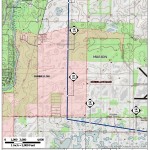FERC’s role for oil pipelines is different than for natural gas pipelines. FERC doesn’t actively promote petroleum products pipelines through federal eminent domain like it does for fracked methane; instead it leaves oil pipeline eminent domain to the states, which for Georgia seems to mostly mean the Georgia Department of Transportation (GDOT).
FERC’s website says about Regulating Oil Pipelines:
The Commission’s responsibilities include:
- Regulation of rates and practices of oil pipeline companies engaged in interstate transportation;
- Establishment of equal service conditions to provide shippers with equal access to pipeline transportation; and
- Establishment of reasonable rates for transporting petroleum and petroleum products by pipeline.
So Kinder Morgan’s Palmetto petroleum products Project does fall under FERC, but not the same way as for Sabal Trail’s fracked methane pipeline.
These FERC oil roles help explain why Continue reading Oil (Palmetto) vs. gas (Sabal Trail) pipelines at FERC
 But FERC’s web page says nothing about FERC’s independence from
the industries it regulates.
But FERC’s web page says nothing about FERC’s independence from
the industries it regulates.

